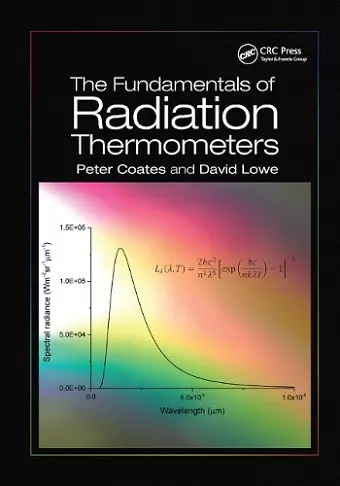The Fundamentals of Radiation Thermometers
David Lowe author Peter Coates author
Format:Paperback
Publisher:Taylor & Francis Ltd
Published:10th Dec '19
Currently unavailable, and unfortunately no date known when it will be back
This paperback is available in another edition too:
- Hardback£198.00was £220.00(9781498778213)

Authored by two highly respected experts in this specialist area, TheFundamentals of Radiation Thermometers is an essential resource for anyone intending to measure the temperature of an object using the radiated energy from that object. This readable, user-friendly book gives important background knowledge for anyone working in the field of non-contact thermometry.
The book begins with an accessible account of how temperature scales are set up and defined, and explores the historic development of temperature scales and Planck’s radiation law. Through explaining the reliability of both emissivity values and extrapolation to different wavelengths and temperatures, the book provides a foundation for understanding when a valid measurement with realistic uncertainties has been made, or if an inappropriate emissivity value has been used with consequent unknown errors.
The book also presents the hardware of radiation thermometers, allowing the reader to specify an appropriate design for a particular measurement problem. It explores multi-wavelength radiation thermometry and its associated pitfalls, and a final chapter suggests strategies to minimise the uncertainties from unreliable emissivity data.
"‘The Fundamentals of Radiation Thermometers’ starts by giving a thorough introduction to the basics of thermometry and the fundamental thermal radiation laws, providing clear explanations that will be useful for any undergraduate studying thermodynamics. Having established a solid set of foundations, the book then describes what is needed to make world-leading temperature measurements, providing design considerations when building radiation thermometers and reminding the reader of techniques that will help to attain optimum performance. Clearly written and meticulous, this book provides a wealth of information that can be utilised by any radiation thermometrist - from new scientists taking their first steps in this field to those with more experience. This is a great book that I wish had been available when I first started!"
—Martin Dury, National Physical Laboratory
"Coates and Lowe aim to provide a firm theoretical background for radiation thermometry and radiation thermometer design and they manage to perform this task successfully and to a very high standard. Diverse areas of physics and engineering are pulled together cohesively, in addition to the authors’ own contributions which are specific to radiation thermometry. Assembling this information would otherwise be a huge task even for the most experienced of radiation thermometer users, designers or researchers to do themselves.
Providing a theoretical basis for radiation thermometers and thermometry, this book explores the link between the local measurements and traceability back to the SI in addition to a survey of the techniques for reducing measurement uncertainty and dealing with the variety of challenges found when using these devices to make measurements outside the controlled conditions of a lab.
This text will be of great use to many professionals and academics. In particular, workers at the National Measurement Institutes will find this book provides sufficient scientific rigour for their purposes. Designers of radiation thermometers will find it useful in helping them rigorously consider their design parameters and will allow them to appreciate the theoretical basis for their thermometers. The book will also allow researchers and industrial users of radiation thermometers to make better use of radiation thermometers for their particular applications and avoid the associated pitfalls of not considering the measurement uncertainties correctly.
‘The Fundamentals of Radiation Thermometers’ is fairly unique in my experience, certainly as a modern text, in providing foundational theory with such mathematical rigour while attempting to bring together all the various areas of scientific and engineering knowledge required in this field."
—Dr Jon Willmott, Senior Lecturer in Sensor Systems, University of Sheffield
"‘This is the book I needed when I started out’, is a paraphrase of Dr Lowe’s comment on first reading the manuscript of this book, which is indeed a masterful account of the fundamentals and techniques of radiation thermometry. The bulk of it was written 20 years ago, but the principles have not changed, and this book will stimulate the reader to think more deeply about the subject and understand it more thoroughly. It is not always an easy read – nor an easy subject – but having read it, a practitioner will possess insights to enable him or her to make a better informed judgement of what method and instrument is most suitable, and how to make the best use of it.
After a general chapter on the quantity temperature, and temperature scales past and present, the book gets into its stride in Chapter 2 with a comprehensive account of the fundamental laws governing the emission of thermal radiation and the quantities which are important in characterising it. Subsequent chapters cover the optical properties of surfaces, thermometer design, detectors, signal processing and strategies for dealing with emissivity.
In short, radiation thermometry is an indispensable measurement technique which has grown in importance and it has also become more affordable. This book covers most of what is needed to navigate through the difficult process of choosing the most effective option for a particular purpose. It may be argued that it deals with principles not with direct applications, such as how to measure the temperature of a steel billet or a silicon wafer or a glass gob. In fact the answers will be found here, once the measurement situation has been properly analysed, and I know of no better place to start looking for them."
—Richard Rusby, Consultant and NPL Fellow Emeritus
ISBN: 9780367889739
Dimensions: unknown
Weight: 467g
264 pages